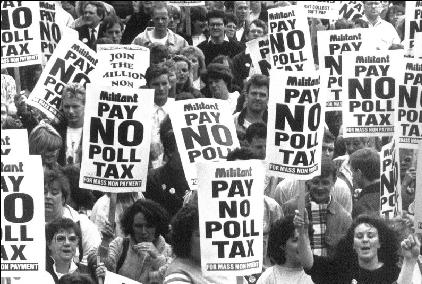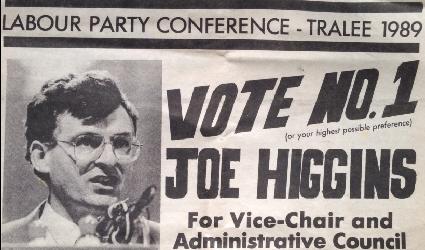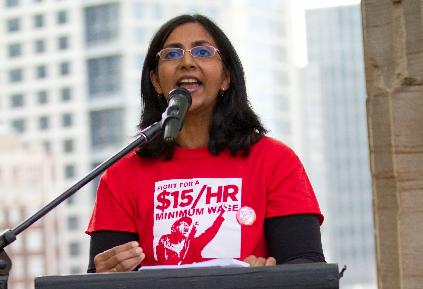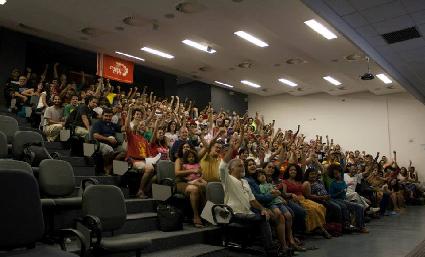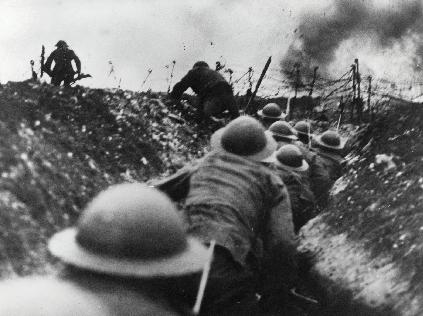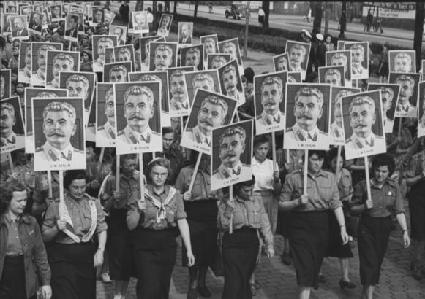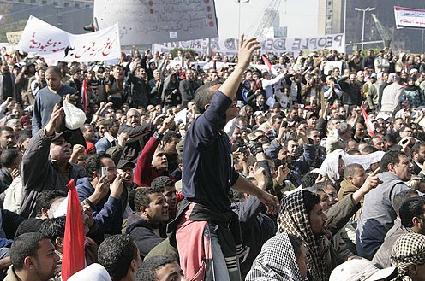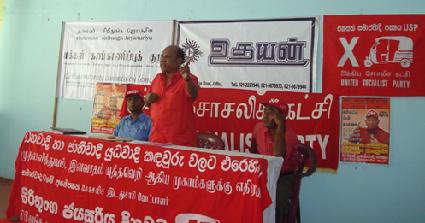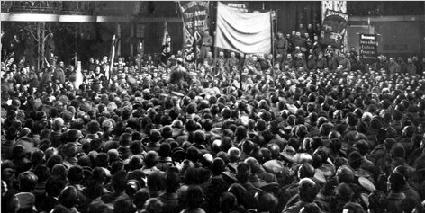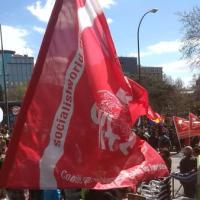 To mark the 40th anniversary of the founding of the Committee for a Workers’ International on April 21st 1974 we are publishing here three items.
To mark the 40th anniversary of the founding of the Committee for a Workers’ International on April 21st 1974 we are publishing here three items.
The first is an interview with Tony Saunois, the secretary of the CWI, on the CWI’s history and development that was originally published in sozialismus.info II/2014, the theoretical magazine of the CWI’s German comrades, Sozialistische Alternative (SAV).
The second and third items, ‘Workers of all countries, Unite!’ and ‘Socialism and internationalism’ are written by Robert Bechert of the International Secretariat of the CWI and one of those at its 1974 founding meeting. These were originally published, in a slightly shorter form, in ‘The Socialist’, the weekly paper of the Socialist Party in England and Wales.
In addition there is a link to the 2004 edition of ‘A socialist world is possible’, a history of the CWI written by Peter Taaffe, a member of the CWI’s International Secretariat and also general secretary of the SP England and Wales.
Click here to access the link.
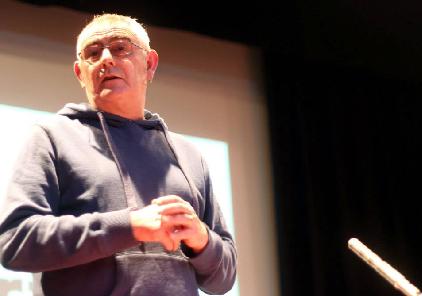
Interview with Tony Saunois
This year is the 40th anniversary of the founding of the Committee for a Workers’ International. Who participated and what was discussed?
The CWI was founded on 20/21 April 1974 at a conference that took place in London. It was attended by 46 comrades. The British section organised in Militant was well represented along with comrades from organised groups in Ireland, Sweden and Germany. In addition, individuals were also present from Sri Lanka, Spain and some other countries. The comrades discussed ’World Perspectives’, ’Programme of the International’ and organisational questions. This meeting represented a very significant step in beginning to politically and organisationally build a new International which adheres to Trotskyist and Marxist methods and ideas.
What were the main reasons for the supporters of the Militant in Britain concluding that a new international organisation had to be built?
From the beginning the comrades at the time were internationalists and always supported the idea of building a revolutionary international. For a period the founders of the ’Militant’ in Britain were members of what came to be called the United Secretariat of the Fourth International (USFI), which at the time was the largest of the ’Trotskyist’ international organisations. But for important political reasons, the members of the ’Militant’ at the time concluded that it was necessary to begin the task of building a new International.
This followed their effective exclusion from the USFI in December 1965. The ‘Militant’, was launched in 1964 and, with Peter Taaffe as its editor, really began to develop. The USFI at that time reduced the ‘Militant’ group to the level of a sympathising section and recognised another group which had split from ‘Militant’.
Previously a series of political differences had developed between the comrades in ’Militant’ and the USFI. These centred on the question of the revolution in the neo-colonial world and also the role of the working class and the programme necessary for the workers’ movement. At that stage the leadership of the USFI were wrongly looking to other forces like the students to play the decisive role in the revolution as opposed to the working class.
The revolutionary processes under way at the time in the neo-colonial world, for example in Cuba and Vietnam, led the USFI to conclude that these developments were central to the world revolution. There was no prospect, they maintained, of a movement of the working class in the advanced capitalist countries for the foreseeable future. These erroneous ideas were a reflection of the consequences of the long, historic, post second world war upswing which capitalism experienced.
The comrades in ‘Militant’ rejected this approach. For them the importance of events in Cuba, Vietnam and other countries was fully recognised as was seen in the extensive material Peter Taaffe later produced analysing the Cuban revolution and its class character. But they also anticipated a new era of capitalist crisis and a resurgence in the class struggle in the industrialised capitalist countries – especially in Europe. The massive historic general strike involving 10 million workers in France in 1968 decisively refuted the ideas defended by the leadership of the USFI and vindicated the approach of ’Militant’.
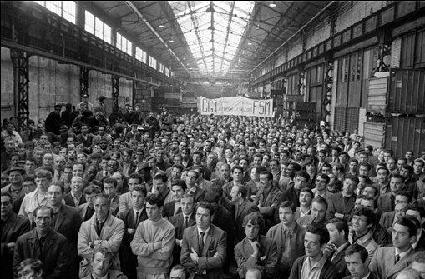
The CWI was a very small force at the time of its foundation. How did this international organisation develop over the course of the next 40 years?
The CWI developed tremendously during the 1970s and the 1980s. In most, but not all countries, our comrades were active in what are now the former mass parties of the working class such as the Social Democrats in Sweden and Germany, the Socialist Parties in Belgium and the Labour Party in Britain.
It was a different historical era; these parties had a contradictory character. They had a pro-capitalist leadership on the one hand – a leadership which in the main accepted capitalism and wanted to reform it. On the other, they had a mass working class support and membership. They were ‘bourgeois workers’ parties’. Workers in that period saw these parties as ‘their’ political parties and a vehicle for struggle and change.
This decisively changed at the end of the 1980s and following the collapse of the former Stalinist regimes in the USSR and Eastern Europe in 1989/92. There was a massive ideological offensive by the capitalist class as these events unfolded. Together with the globalisation of capitalism and the neo-liberal offensive, it resulted in the leadership of these parties finally dropping the pretence of standing for socialism. They fully and openly embraced capitalism. These parties lost their base amongst the working class who no longer looked towards them to transform society but increasingly supported them in elections only as a “lesser evil”.
However, in the 1970s and 1980s, this was not the case. In Britain ’Militant’ supporters took a majority on the National Committee of the Labour Party Young Socialists in 1970. It was a relatively small organisation at the time. However, it was turned outwards and built into a campaigning, fighting young workers’ organisation. At its height, it had approximately 10,000 members.
In other countries like Belgium, Sweden, Ireland, CWI members fought for our policies and won support. In Britain the successes in the LPYS coincided with a surge to the left in the British Labour Party. ‘Militant’ won increased support in its ranks and also in the trade unions. At one stage we secured the election of three MPs.
In Ireland, ‘Militant’ supporters won a majority in Labour Youth and won an important influence in the Irish Labour Party. Through gaining the majority that ‘Militant’ secured in the LPYS, we were able to attend many international meetings of the socialist youth organisations which were affiliated to the International Union of Socialist Youth. Through these events we met other comrades who became collaborators and members of the CWI.
New sections of the CWI were established in this way, for example in Austria. In some countries, such as Sweden, the bureaucracy of the Social Democracy feared comrades so much that they were rapidly expelled from the youth section – the SSU. Through the LPYS in the 1970s, international campaigns such as the ’Spanish Young Socialists Defence Campaign’ were launched. This was to build solidarity with the workers’ movement and young people fighting to bring down the Franco dictatorship. Through this work, we not only managed to build solidarity for the struggle in Spain but met socialists who went on to form a section of the CWI in the underground.
Throughout this period the CWI expanded dramatically. A ’Marxist Workers’ Tendency’ was formed in South Africa which stressed the need to build independent trade unions in the struggle against apartheid and for Marxist polices to be adopted by the ANC. In Greece, a CWI section was established by the fusion together of different groups which fought for revolutionary ideas in the then newly formed Socialist Party – PASOK.
While the orientation towards the traditional mass parties of the working class predominated in the 1970s, the CWI also developed important forces working openly as revolutionary parties. This was the case in Sri Lanka and later also in Nigeria.
In the 1980s the revolutionary upheavals which rocked Latin America compelled the CWI to undertake interventions in these events. Comrades were sent to Argentina, Chile and later to Brazil to establish sections of the CWI in these countries. The Chilean Socialist Defence Campaign was launched to support these efforts in the underground and assisted in supported the formation of our Chilean section.
Our work was so successful in Britain that we won a decisive influence and leadership in Liverpool Labour Party. Through our leading influence on the city council, the comrades came into a head-on struggle with the Thatcher government. In this period most of our sections were rapidly increasing their membership and the section in Britain reached around 8,000 members at the height of the anti-Poll Tax struggle.
However, the world situation was changing and opened a far more complicated period for Marxists and the working class. The application and introduction of neo-liberalism, which began in the 1980s and was re-enforced by the collapse of the former Stalinist states, ushered in an entirely new era.
The worker’ movement internationally was thrown back politically. The former mass workers’ parties openly embraced and defended capitalism and the ’market’.
In Britain, supporters of ’Militant’ were expelled from the Labour Party thus preparing the way for the totally pro-capitalist Blairite Labour Party, inherited by Miliband. These changes forced a debate and discussion amongst the whole of the left including the ’Trotskyist’ left and the CWI.
Within the CWI the overwhelming majority of members recognised that a new world situation was opening up, posing new tasks for revolutionary Marxists. As the former Stalinist regimes collapsed, the CWI sent comrades to each of the countries concerned. Comrades went to Poland, Czechoslovakia, Hungary, Romania, East Germany and the former USSR. The CWI was amongst the first to recognise the process of capitalist restoration which was under way.
Following debate and discussion, we also saw that in more and more countries the period of work in what were becoming, or had become, fully capitalist parties needed to end. We concluded that revolutionaries now faced a dual task. This consisted of struggling to build revolutionary parties but also fighting for the formation of broad new mass workers’ parties which would represent a huge step forward for the working class in the light of the consequences of the collapse of the Stalinist regimes.
Despite the protracted nature of this process it still, we believe, retains its validity. One of the central tasks was, and remains, to rebuild support for the idea of socialism as an alternative to capitalism. Of course all the conclusions we have drawn today about this process could not have been immediately reached as the historic events of 1989/92 unfolded. However, the CWI majority were prepared to recognise the historic changes under way and were among the first to draw the necessary conclusions.
A minority of the CWI, however, kept their eyes firmly closed towards such developments. They were, and remain, imprisoned in the idea of working politically in what have become completely bourgeois parties. They initially refused to recognise the process of capitalist restoration which was under way in the former USSR and Eastern Europe or the consequences which flowed from it. A new world situation was being ushered in and the old formula no longer applied. However, they remained content to simply repeat it, irrespective of the changing world situation. This resulted in a split in the CWI in 1992 with the CWI majority parting company with a conservative minority.
Like all other forces on the left, numerically the CWI sections were pushed back in the 1990s. As events unfolded we took important initiatives to try and reach out to a new, younger generation. We launched the campaign ’Youth against Racism in Europe’ and succeeded in mobilising 40,000 Europe-wide to an anti-racist protest in Belgium.
Despite being pushed back numerically in the 1990s, we emerged, as an International, politically strengthened and tactically better prepared to meet the challenges of the 1990s and the first part of the 21st century. Had the CWI majority not made the political and tactical adjustments necessary to face up to the new period following the collapse of the former Stalinist states we would have been pushed even further back, as those who split from us have been.
Today we are building important, strengthened sections in many countries – 48 at the present time. Some are working in extremely difficult conditions and are swimming against the stream or facing the consequences of counter-revolutionary forces. For example our comrades in Pakistan, Sri Lanka and Israel. In other countries, however, we are poised for an important and potentially historic breakthrough.
In South Africa we have played an important role, together with the miners, in launching a new workers’ party – the Workers’ and Socialists’ Party (WASP). This has been re-enforced by the historic election victory of Socialist Alternative in Seattle USA. In Britain we have maintained and developed a strong base in the trade unions. In Ireland we have built an important influence reflected in the election successes that the comrades achieved in both the Irish Dail and the European Parliament. Now we need to prepare for other advances and important challenges in an era of intense global capitalist crisis and conflict.
What do you think have been the main assets the CWI has developed for the international workers’ movement in terms of ideas and methods?
I think the strength of the CWI politically can be found it its capacity to apply Marxism as a method and not as a rigid dogma. It is a weapon to enable workers to analyse events at each conjuncture and to draw the necessary conclusions of what is necessary to take the workers’ struggle forward. This has enabled the CWI to engage with workers and young people at each stage and to establish a dialogue with them, taking into account their political consciousness and awareness. It has allowed us to try and convince them of our ideas and programme. Doing this without falling into the trap of either opportunism or sectarianism is one of the greatest tests for a revolutionary organisation. While this or that mistake has of course been made, in general we have avoided it.
This method has enabled us to analyse the complexities of the modern world and crises which have developed, especially in the neo-colonial world in the recent period. It allowed our comrades in Venezuela to adopt a principled and balanced approach towards the Hugo Chavez government and the revolutionary process, unlike other groups. This method of analysis was vital in analysing the collapse of the Stalinist states, the consequences that this has had for the international working class and, crucially, in drawing the conclusions we have in relation to the tasks facing the working class and revolutionaries in this new situation.
In the complex situations which have arisen in countries like Egypt, Tunisia, Syria, Libya and now the Ukraine and Russia, this method has enabled us to adopt a principled position and avoid the mistakes of some other organisations which have either backed imperialist intervention or simply lent support to opposition forces which have assumed in some cases a reactionary character. Since the collapse of Stalinism, our struggle to form broad, democratic, new mass parties of the working class and combine this with the need to maintain and build revolutionary Marxist parties, is a crucial part of the political work and strength of the CWI.
What were the main successes of the CWI?
The CWI in many countries has scored some very important victories. The recent election of Kshama Sawant in Seattle and the role played by members of the DSM in South Africa in assisting the miners and others to launch the new workers’ party, WASP, are crucial steps forward in the recent period. They mark the opening of a new chapter of the class struggle and the work of the CWI. To this must be added the tremendous work of our comrades in Ireland over many years – the battles they fought over the water charges and bin charges campaign, the election victories scored by Joe Higgins from the Socialist Party and others. All are crucial landmarks in the work of the CWI and examples can be given from many countries.
However, thus far, the most significant has been the massive impact we had in the British Labour Party in the 1970s and particularly in the 1980s which allowed our comrades to really have an effect on the situation and in the workers’ movement. Mass work and the leadership of mass movements was undertaken in that period. ‘Militant’ was a household name. The election of three MPs – Dave Nellist, Terry Fields and Pat Wall – reflected this.
Through this influence we mobilised millions in the anti-poll tax campaign which ultimately caused the downfall of the hated Margaret Thatcher. In this period in Liverpool, ’Militant’ supporters led the council into battle against the Thatcher government and forced it to give concessions. A city-wide general strike and mass demonstration of 50,000, as part of the campaign, demonstrated how ’Marxists’ can use the platform of local councils and MPs to help mobilise workers and fight for their rights.
This work over decades meant that ’Militant’ succeeded in conducting the most effective work done in Europe by ’Trotskyists’ in the workers’ movement and amongst the working class. Thus far these are amongst the greatest successes of the CWI. Some of our smaller sections have also been able to have a significant impact. The election of councillors in Australia and the struggles led by comrades there, the courageous work of our Pakistani and Israeli comrades are an illustration of this.
It is also necessary to stress that following the collapse of the former Stalinist states, Marxists internationally have faced an extremely difficult two and half decades. In some respects, due to the ideological assault by the ruling class against the idea of socialism and the capitulation by the official workers’ leaders to capitalism, these have been amongst the most difficult of decades.
On the Marxist left, many abandoned support for revolutionary ideas and the struggle to build a revolutionary party. Even the CWI was partly affected by this when former members in Scotland abandoned the idea of building a Marxist revolutionary party. However, the overwhelming majority of the CWI has fought through this difficult period and taken the steps forward that were possible.
It is a great achievement that the CWI has been capable of analysing the political developments during this period and the tasks for the working class and revolutionaries. That we have emerged with the forces we have is also a colossal achievement. The new era of capitalist crisis that is now developing will give new opportunities for all of the supporters and sections of the CWI to build more powerful forces and lead even bigger successes than we were able to achieve in the 1980s in Britain.
What is the relationship of the CWI with other organisations and tendencies who consider themselves Marxist and revolutionary? Does the CWI have the view of developing into a mass force ‘on its own’ and what role could cooperation or even mergers with other forces play?
The CWI is prepared to meet the new challenges of the situation which are now opening up internationally as a consequence of the systemic crisis in which world capitalism now finds itself. It means a catastrophe for the working class and the poor internationally. Already the horrors of capitalism in crisis have plunged some countries into barbarism and slaughter. Mass unemployment with few prospects face an entire generation in Europe and on all continents. The effects of climate change are having a devastating effect on all the peoples of the planet.
There is an urgent need to build a powerful mass workers’ international. The CWI is striving to achieve this objective. At this stage the CWI is not such a force. While confident and proud of our achievements and what we will be able to achieve in the next period we are also realistic. The CWI is not a mass international. The name, Committee for a Workers’ International, was adopted for this reason. We believe that the forces around the CWI have a crucial and decisive role to play in building s new mass international.
At the same time we recognise that other forces exist which adhere to ‘Marxism’ and ‘Trotskyism’. Where such forces are serious and are prepared to have an honest political discussion and debate, we are ready and open to enter discussion and dialogue with them. Joint campaigns and international solidarity, along with other activity, are possible and are indeed organised by the CWI and its sections together with other forces.
If political agreement on a principled honest basis can be reached, then it would be irresponsible of any revolutionary organisation not to strive to come together on a unified basis and take advantage of this strengthened position. However, it is in our view a mistake to attempt such a unification where there is not sufficient political agreement. This will only result in further disagreement and division and disappointment.
Following the collapse of the former Stalinist states, a period of debate and discussion opened up in all of the ‘Trotskyist’ groupings and Internationals. In the past we fused together with Trotskyist and Marxist forces in Sri Lanka and later in Nigeria. More recently our comrades in Brazil have successfully fused together with forces from other traditions and are successfully intervening in the party, the PSOL (’Socialism and Freedom Party’).
In the 1990s the CWI sought to open a dialogue with other international organisations to see if there was the prospect of reaching agreement in a new world situation. We visited and engaged in some discussion with international organisations like the USFI, the International Workers League (LIT), the International Workers’ Unity (UIT) and others. However, there was not sufficient agreement.
Nevertheless, the CWI remains open to debate and discussion with comrades from these and other traditions to see if there is agreement and we are open to collaborate in joint campaigns and activity where possible.
The building of a new mass international will not develop only through one grouping. New parties and forces will emerge in the future as a result of the class struggle which do not yet exist. They, together with some already existing forces, will play a crucial role. We believe that the analysis, methods and ideas of the CWI and its forces will and must play a central part in this process.
The building of a new mass international is now an urgent task. There are however no short cuts. The rebuilding of the workers’ organisations and support for the alternative of a socialist society will develop amongst a new generation of workers as a result of their experience in the class struggle. The CWI and others can assist this process in the coming period.
The experience of our relatively small forces in South Africa, who have played a decisive role in helping to form WASP, illustrates that under the right objective conditions, where the working class is seeking a socialist alternative, illustrates the prospects that will open up for most of the sections of the CWI in the coming period. The CWI has achieved a tremendous amount in the last forty years – nearly half of which consisted of considerably difficult objective conditions. However, our future achievements and successes, we are confident, will surpass all that we have managed to do so far.
Workers of all countries, Unite!
Robert Bechert of the International Secretariat of the CWI, looks at the historic background to the CWI’s foundation.
Practically from the dawn of the workers’ movement there was an understanding that the struggle against oppression and capitalism was international. Already in 1848 Karl Marx and Friedrich Engels explained in the Communist Manifesto that “modern industry has established the world market … The bourgeoisie has through its exploitation of the world market given a cosmopolitan character to production and consumption in every country … In place of the old wants, satisfied by the production of the country, we find new wants, requiring for their satisfaction the products of distant lands and climes. In place of the old local and national seclusion and self-sufficiency, we have intercourse in every direction, universal inter-dependence of nations.”
For socialists and working class activists the conclusion was expressed in the Communist Manifesto’s ending that, in the face of an international capitalist system, the need was to adopt the call: “Workers of All Countries, Unite!”.
From those early days socialists saw that an international bringing together of workers’ organisations should not be limited to building solidarity between workers in different countries. Above all it was seen as first an instrument for helping to build workers’ movements around the world and increasingly as a forum to discuss and decide upon their policies.
While there had been earlier international socialist organisations it was the First International, founded in 1864, which brought together the different forces in the then newly arising workers’ movement, helped give them a firm political basis and strengthened the cadre of activists. While the First International collapsed in 1876 in the aftermath of the crushing of the Paris Commune less than 15 years later, in 1889, a new International was created. This body, later called the Second International, was formed by a number of growing parties. It soon came to symbolise a dramatic growth of workers’ organisations and a popularisation of socialist ideas – with most of its member parties formally accepting Marxism as their political basis.
But political debate continued and repeatedly centred on the question of whether to attempt to reform capitalism or overthrow it. While some, especially rank-and-file, reformists may have genuinely believed that reform was an easier way to change society and achieve socialism, for the growing number of leaders this policy marked their own personal adaptation to capitalism.
This reflected the contradictory fact that the growth of a powerful workers’ organisation while obviously strengthening workers’ ability to struggle, also posed the danger of giving birth to conservative strata, enjoying comfortable careers. They were increasingly reluctant to challenge capitalism, something which already before 1914 had led to some fierce debates as the left fought against opportunism and adaption to capitalism.
1914 – A turning point in the workers’ movement
But it was only with the outbreak of World War One that the strength of the pro-capitalist elements at the top of the workers’ movement was clearly revealed. The overwhelming majority of Second International leaders supported their ‘own’ ruling classes and empires. This was a fundamental break with the principles and previous decisions of the International to oppose a war between the competing imperialist powers. While in Russia and a few other countries genuine socialist parties opposed the war, in most combatant countries only small minorities opposed the war when it broke out in 1914.
This decisive change, combined with the role of the Second International leaders in helping to suppress revolutionary movements in their own countries, transformed the workers’ movement.
Against this background the socialists who refused to accommodate themselves with capitalism argued that it was necessary to fight to free the workers’ movement from this poisonous pro-capitalist influence. The victory of the October revolution in Russia in 1917 transformed the situation. The German revolutionary Rosa Luxemburg summed up the feeling of many activists and workers around the world that the Bolsheviks, “Lenin and Trotsky and their friends” set “an example to the workers of the world”.
The example was both political – programme, strategy and tactics – and organisational, in the sense of building workers’ organisations, especially a political party, that were willing and able to fight to end capitalism. The subsequent struggle in the workers’ movement was fierce, sometimes bloody as the pro-capitalist elements sought to drive out, and sometimes even murder, the left.
Internationally this split was seen in the 1919 formation, on the initiative of the victorious Bolsheviks in Russia, of the Communist International, an organisation then dedicated to overthrowing capitalism. It had a mass base in many countries as the events of 1917 in Russia sparked a mass revolutionary wave that travelled around the world. However the Communist International did not fulfil its early promise.
Stalinism’s rise
The defeat of post-World War One revolutions in Europe led to isolation of the Soviet Union. In post-war conditions of poverty, exhaustion and underdevelopment an increasingly privileged strata was, under the false banner of ‘protecting the revolution’, able to gradually consolidate its power and suppress democratic rights.
This was the basis for the rise of the Stalinist dictatorship which increasingly tried to avoid international upheavals or revolutions that could disrupt its rule. Thus, desperate to avoid war, it suddenly in 1939 signed a deal with Hitler, which included supplying raw materials and returning German anti-fascist refugees to Nazi Germany.
But this did not, as Leon Trotsky wrote at the time, prevent a Nazi attack on the Soviet Union in 1941. Later, allied with the US and Britain, Stalin decided in 1943 to dissolve the Communist International as a way of showing that his regime was not seeking to overthrow capitalism internationally but rather seeking an accommodation with the main capitalist powers.
Trotsky, the co-leader with Vladimir Lenin of the Russian Revolution, who in the 1920s led the opposition to the rise of the Stalinist system, had already drawn the conclusion in 1933 that the Communist International was no longer capable of leading the struggle against capitalism. This was after the Nazis came to power in what was probably the worst defeat that the workers’ movement has ever suffered and the one with the biggest repercussions.
The impact of the Nazis’ victory
However this defeat was not at all inevitable. Then the German workers’ movement was the biggest in the capitalist world. The Communist Party in Germany was a significant force, winning nearly 17% in 1932. However, in practice, it was unable to build a united front of workers against fascism as it effectively equated the Social Democrats, whom it called “social-fascists”, with the Nazis.
But after Hitler’s victory there was no open discussion at all within the Communist International over what had happened to its biggest party outside the then Soviet Union. For Trotsky and his followers this meant that the Communist International had ceased to be a real living political organisation, instead it had become a bureaucratic machine where the leadership imposed its will without any questioning from below. Such an organisation cannot build a movement that can overthrow capitalism, something which can only be based on democratic debate and genuine workers’ control and management. This is necessary both to build a living mass workers’ party and to guard against the threat of its decay.
A new, Fourth, International
Thus, once again, the question of building a genuine international was posed. However, while Trotsky raised the banner and programme of a Fourth International in the 1930s, initially it was only in Ceylon/Sri Lanka, Vietnam and Bolivia that it attracted large forces, although in the 1930s and 1940s especially its activists played important roles in struggles in other countries. During the more difficult political period after the Second World War political, and organisational, disagreements led to divisions within the Trotskyist movement. It was out of these debates and experiences that the CWI was formed as an organisation aiming to build a workers’ international based on the political traditions defended by Trotsky and the experience in the decades since his murder. Over the last 40 years the CWI has grown worldwide as individuals and groups have joined with us in the work to build an international socialist movement that can transform the globe.
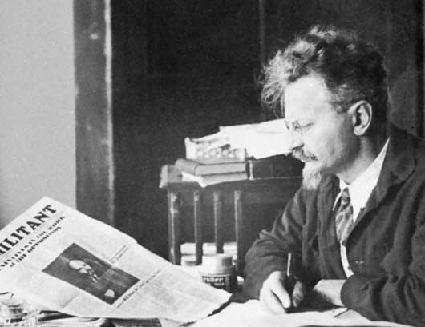
In striving to achieve this aim we do not see past events as dead history. On the contrary, while paying tribute to past courageous working class struggles, we aim to learn, and apply, the real lessons of these events in the battles of today and tomorrow.
Socialism and internationalism
Robert Bechert explains the need for an international in the 21st century.
Since the beginning of the 20th century every decade has witnessed revolutions as the working and poor masses attempt to end the oppression and exploitation they suffer under capitalism. There have also been mass struggles, revolutions, counter-revolutions and mighty, world changing, developments. The old empires have disappeared, the world’s balance of forces has repeatedly changed, the world’s population has become urban and younger while environmental and climate threats have become major international issues.
The past 40 years have been no exception to the story of mass struggle. A mere four days after the CWI’s formation, 48 years of military and dictatorial rule in Portugal were ended with the 25 April revolution. A few months later the Greek military junta collapsed. But history does not develop in a straight line. In both countries the ruling classes were able to survive mainly because the mass movements that threatened them did not have a concrete strategy of how to replace capitalism, and a leadership prepared to lead that battle.
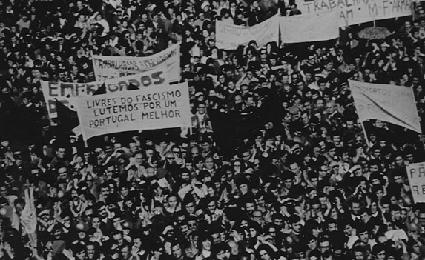
Arguing for Socialism after Stalinism’s collapse
The past 25 years have been complicated by the collapse of the Soviet Union and the other Stalinist states. Being ruled by a privileged totalitarian elite meant that these states could not be regarded as socialist. However, the fact that they rested on a planned, nationalised non-capitalist economy meant that their very existence proved that capitalism was not the only possible system.
The post-1989 collapse of these states into capitalism was utilised by the ruling classes in their counter-offensive after the radicalisation of the 1960s to 1980s to ideologically claim that there was no alternative to capitalism. This helped accelerate the rightward, pro-capitalist move in much of the labour movement.
But since the 2008 onset of the latest crisis in global capitalism we have entered a new world period. In many countries, especially the main imperialist ones, capitalism means living standards have fallen or are still falling. However, an important feature today is that a combination of globalisation and communication innovations has strengthened an international consciousness.
Growing numbers see the questions of the economy, war and peace, and the environment as international and also as tied to capitalism, or at least to the domination of the giant financial, manufacturing and trading corporations. At the same time more people are aware of the possibilities inherent in scientific and technological advances if they are utilised in the interests of the population and the environment rather than corporate profit. But most importantly, the experience of austerity and the struggle against it is forging an understanding of the need to change society fundamentally. Thus events like the 2011 overthrow of Egyptian dictator Mubarak had a worldwide impact.
These developments have provided an important potential base for an international socialist organisation, linking together movements around the globe. This century has already seen international movements and struggles, such as the opposition to the US and British led invasion of Iraq, the worldwide Occupy/Indignados protests, the anti-austerity protests in Europe, the impact of the 2011 Tunisian and Egyptian revolutions and the recent international dock workers’ struggle.
But if the workers’ movement cannot provide a concrete answer to today’s issues then there is the danger that reactionary nationalist ‘answers’ can gain support, laying the basis for future chauvinist or ethnic conflicts within and between states. One of the objectives that the CWI set itself 40 years ago is to help arm the workers’ movement with a programme and strategy to both win our immediate battles and to remove capitalism’s poisonous grip over the world, starting with explaining the central role of the working class.
CWI’s foundation in a revolutionary time
It was not accidental that the foundation of the CWI took place in a very turbulent and radical period. The long post-World War Two economic upswing was ending. But already, before the 1973 oil crisis that came to symbolise the changing economic situation, Europe and then Latin America had been gripped by revolutionary movements and crises, especially France 1968. In Vietnam US imperialism was facing its first ever military defeat. The Stalinist regimes had been shaken by the 1968 ‘Prague Spring’ in the then Czechoslovakia and the 1970/71 wave of workers’ strikes in Poland, movements which were not pro-capitalist but in essence looking towards establishing a workers’ democracy.
At that time the trade unions in Britain, the CWI’s first base, were at a high point, but not just in terms of numbers. The miners’ victories and the 1974 defeat of the Tory government in the “who runs the country” election showed their potential strength.
The onset of a generalised capitalist crisis deepened a political radicalisation in the workers’ movement in many countries. The bitter experience of the bloody 1973 overthrow of the Allende government in Chile provoked a wide discussion on how socialism could be achieved and also how to prevent counter-revolution blocking the labour movement’s path. It was truly a period of international struggle.
In 1974 the Spanish dictatorship of Franco, faced with a developing revolution, was crumbling. But the Spanish ruling class sought, and obtained, the help of the workers’ leaders to contain the revolutionary movement within capitalism and establish a capitalist, not a socialist, democracy.
Against this background the Marxists who founded the CWI, then around the Militant newspaper, had begun to reach a much wider audience in Britain and soon in other countries. Internationally this was initially mainly in Europe but also in Sri Lanka, where the history of a Trotskyist movement with mass support meant that the ideas of the CWI found an early echo.
However despite the worldwide revolutionary upheavals of the late 1960s and 1970s the idea of a real workers’ international, while attractive to many activists, had became less central to the mass of the workers’ movement. Mainly this flowed from the failure of both the Socialist and Communist Internationals to remain and develop as organisations that strove to change the world. But in the 21st century, with the world’s obvious and growing inter-dependence, the issue of international action and struggle is once more being sharply posed.
Alongside the need for global solutions the experience of the workers’ movement has again and again shown that protests alone can win individual demands but not fundamentally change the situation, something which can only be achieved by overthrowing capitalism. But to securely achieve that a movement needs a concrete programme of action that provides national and international answers and a clear-sighted leadership, both of which require a party to formulate and help put into action.
How to permanently win struggles?
Today the capitalists have little optimism. They lack confidence, as revealed in their current discussions on whether they can stop funnelling money into many economies via Quantitative Easing (QE) and, if they do, what will be the effects?
These conditions are preparing new periods of struggle and revolution. Generally in this period of crisis most struggles have been defensive, against the ruling classes’ onslaught, but in countries which have seen economic growth, like Brazil and China, there have been offensive battles to win improvements.
In Greece the workers have conducted an incredible 36 general strikes since 2010, but have not been successful in stopping the ruling class’s onslaught. But this does not rule out a new radicalisation, perhaps initially on the political plane. Simultaneously sections of the movement are drawing lessons from their experiences, a process which the CWI supporters in Xekinima are both part of and influencing.
The revolutions and mass struggles of recent years have again posed the age old question of how can gains be consolidated and the old order really removed? Egypt is the latest example of where, in February 2011, the working masses potentially had power in their hands but did not fully understand that or see what needed to be done.
Mighty revolutions can almost completely sweep away the old order but, as in Portugal after 1975, it can come back if the working class does not secure power. Obviously every revolution and struggle has its own characteristics, but in revolutions the general lesson of how the working class and poor in Russia were able to come to, and stay in, power in 1917 is still essential.
Today’s situation is similar in some ways to the late 19th century when the mass workers’ movement developed. Now it is a question of re-building or building afresh workers’ organisations. A complication is that, in many countries, workers have the bitter experience of the decay or collapse of the old workers’ organisations, with especially the former social democratic, socialist and communist parties now mostly being transformed into pro-capitalist or totally capitalist organisations.
Rebuilding, and rearming, the workers’ movement
The CWI is, in many countries, playing a key role in this rebuilding and, where appropriate, arguing that a start must be made to create new political parties of the working class as a step towards building a mass socialist workers’ movement. But it is not just propaganda. In Britain, South Africa and Nigeria CWI sections have been instrumental in steps being taken to form new parties. In countries like Australia, Ireland, Sri Lanka, the USA and Sweden, CWI comrades currently fight elections under their own banner.
Where left parties exist, like PSoL in Brazil and Die LINKE in Germany, CWI comrades are active in them while also arguing what steps need to be taken to further build them as socialist organisations. This is essential because without a clear socialist programme new workers’ parties can follow the path of the old ones, like the PT has in Brazil, or simply eventually collapse as the Prc has recently done in Italy. Arguing for such a programme is part of our CWI tradition. But from our beginning we have not been just debating policies, we have always been active – participating in and initiating struggles, big and small.
But in many ways these first four decades are really only a pre-history. We are already in a tumultuous period, everything is either being questioned or soon will be. The experiences of this period of capitalism, the growing environmental crisis, with no future on offer to the vast mass of young people, will produce revolutionary storms. The CWI will play a full part in these events, including the building of a movement that can finally end this brutal, chaotic and unfair capitalist system and make life a pleasure for all.



